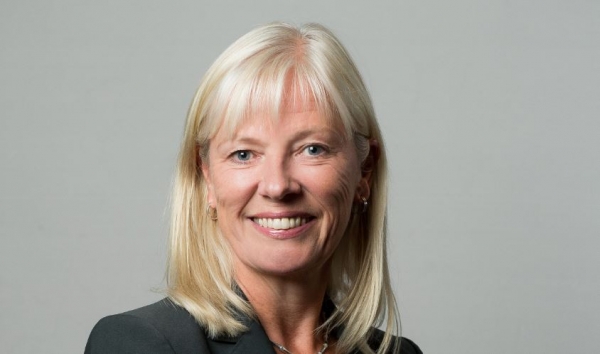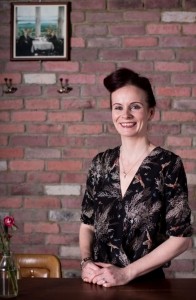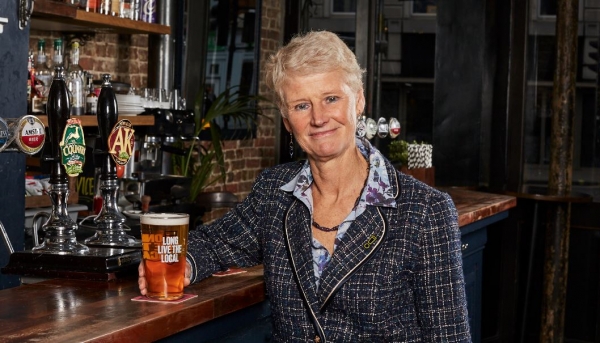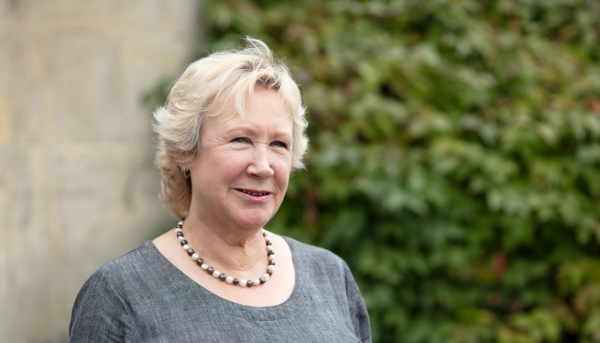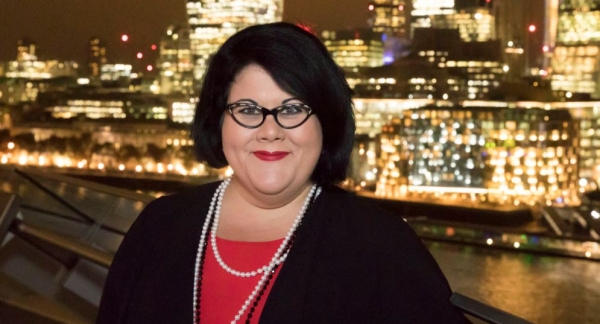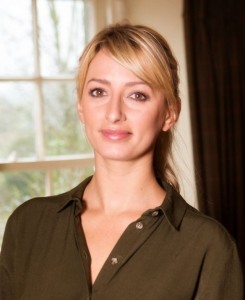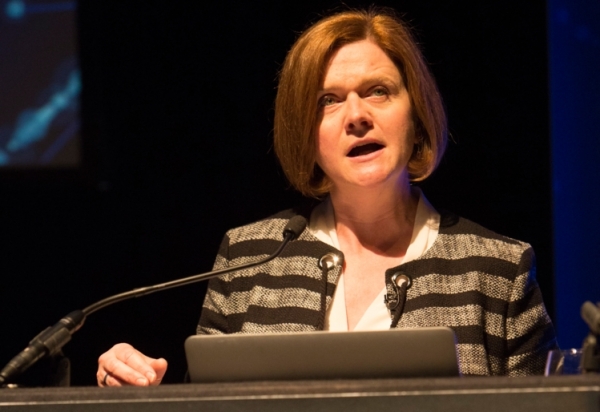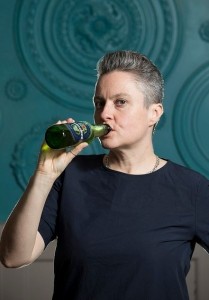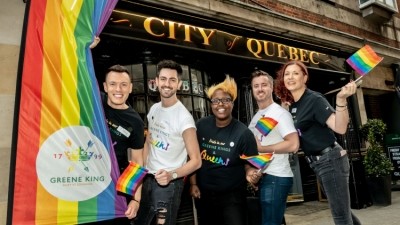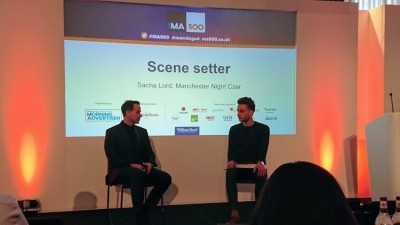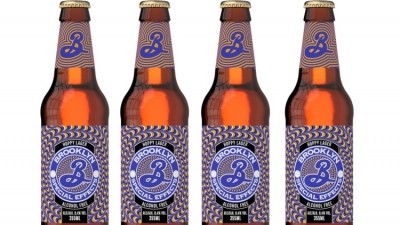International Women’s Day
The women who lead in the on-trade
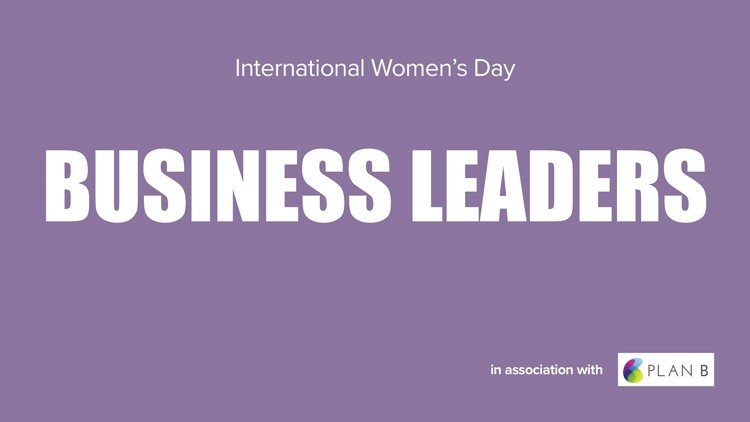
To champion and celebrate women in the on-trade, at all levels and across a variety of job functions, The Morning Advertiser has collected the life stories and advice from some of the most inspiring people in the sector.
This section of our list was supported by Plan B, information about which can be found below.
Name: Suzanne Baker
Job title: Commercial director, Stonegate Pub Company
How you got there:
Bar to boardroom. I went to catering college and then a gained a hospitality degree as I really wanted to work in hotels. While studying I always had waitress/bar jobs in pubs, which led me to join Grandmet Retail.
Over the years there, I covered operations running sites, working at head office in marketing, catering and procurement which gave me a really broad experience.
I took a gamble leaving a successful PLC and joined JD Wetherspoon when they only had 30 pubs, but I liked the philosophy and it was exciting and very different at that time.
I was able to use my experience in all areas to help develop and grow JDW, plus I met a very understanding husband!
I was promoted to board director of a PLC company at 33 after just having my first son, both great highlights of my life. Thirteen years later, with the addition of another amazing son, I decided it was time to do something different.
- Women who lead in pub kitchens
- The women who are leading in beer
- The women who lead in the on-trade
- The women bartenders who are shaking things up
- The women at the top of on-trade PR and marketing
I joined Laurel and Ian Payne MBE. This took my career to another level, working with multi formats within a private equity business is very different and you are always learning.
We took Laurel through a number of different company ventures and today I am commercial director of a very successful pub company running 772 sites.
The multi format business makes me proud that our customers can start the day with breakfast in one of our great bars, stop for a tasty lunch, enjoy cocktails in a Slug & Lettuce or Be At One and still be partying the night away at 3am in a Popworld!
I am proud of what I have achieved, having enabled our customers to have a fun time as well as employed and developed some amazing people, who I have loved working with.
Having directional leaders has helped and I thank Ian Payne, Simon Longbottom and Tim Martin for the opportunities.
Where you see yourself next:
Completing the journey with TDR and Stonegate – I have so enjoyed this – and to grow the company as much as we can.
I will not be able to retire, but I would like to be involved in some non exec roles and share my experiences and learnings with others, especially to help young aspiring women.
Biggest issue for women in our trade right now?:
Late night is an issue.
What, if any, experiences of sexism in the workplace have you encountered?:
It still exists, although things are getting better. Most businesses, including ours, have policies in place that address this issue as we work to improve diversity in the sector.
Your advice to others who want to achieve what you have:
Passion, commitment and energy. Plus a network of support.
Name: Sarah Wall
Job title: MD Livelyhood
How you got there:
Before starting up Livelyhood I developed a broad toolkit of skills from my time working with others and working for myself.
During this period I enjoyed some brilliant successes, but also quite a few not such winning moments and it’s these lessons that formed the strong foundations on which Livelyhood was built.
I have had to be brave at certain junctures and focused to the point of obsession.
Self belief and resilience have certainly been called on during trickier times and I took some fairly large but qualified risks that thankfully paid off.
I think you need to be so driven and hugely motivated to start up your own business in this industry and with tight budgets, creativity has always been essential, as well as a little bit of luck.
Building a business is a constant journey, littered with crossroads and curve balls, but huge successes and crazy, funny moments.
I believe in always leading your people and recognising that your success relies on growing a talented and motivated team.
You also need to be able to have a word with yourself, seek and welcome opinions from others, but be able to evaluate all of that, before you make your decisions.
Where you see yourself next:
For now, right here at Livelyhood. Continuing to grow this business, creating further opportunities for our people to develop and become an employer that people seek out to work for.
I would love to open Livelyhood locals in more parts of London and the surrounding areas to deliver on our strategic and financial targets and enjoy the success of that.
Mentoring in the fast lane
Corporate boards perform better when they include the best people, however despite this single proven truth, over the past 10 years the diversity of boards, to include women has barely changed.
The Plan B team: Ann Elliott from Elliotts, Holly Addison from Odgers Berndtson, Kate Nicholls from UK Hospitality and Emma Causer from BT Sport, wanted to create a way of supporting great female talent towards those strategic leadership roles. We knew that mentoring is a proven and effective way of creating this support, but we wanted to have something that would have a high impact, and help create that change quickly.
Speed Mentoring is proving to be a great solution to this. Thirty people all in one room, all working to the same goal, with the same passion, creates that energy for change. It kick starts a mentoring process that then continues into the future, and each mentee gets to own their progress.
We are looking for brilliant senior women in the industry who are looking to be mentored. If you want support, or you wish to nominate someone who you know would be perfect, then please contact us.
Our next sessions are on 14th, 15th and 21st May and the 09th, 15th and 16th Oct in London. If you want any further details then please email CynaO@bqtreforeaqgfba.pbz.
Biggest issue for women in our trade right now?:
Being given the opportunity to progress in the industry throughout their entire career and being provided with opportunities that continue to develop their skills sets all the way along the road.
This, in turn, ensures that the industry continues to benefit from those hard working and committed skill sets.
What, if any, experiences of sexism in the workplace have you encountered?:
When I was employed during my 20s, it was something that was very evident in the places that I worked in at the time.
Unfortunately, in hospitality, I think it is something that we know does happen but we must be very clear that it has no place to.
It is important to ensure that message is clearly communicated to encourage those who may have had such experiences to come forward and to hopefully stamp it out entirely.
For me personally, as a business owner, I can recall times when individuals have wrongly assumed that someone else must really run the business, that I was probably just the day-to-day ‘on the ground’ person because, as a woman, it couldn’t possibly be me running it!
In terms of Livelyhood, I think it is important to ensure that the workplace is a professional, welcoming and inclusive environment.
This is very important to us and underpins our decision making in critical areas to ensure that we maintain this as much as we can day-to-day and as we grow.
A fair approach, across the board in terms of opportunities and remuneration are also embraced.
Your advice to others who want to achieve what you have:
Chose to do something that you are truly passionate about. Building a business is hard work so a real enjoyment of it is vital.
Have a clear plan and recruit your team based on their shared passion for it.
Recruiting the right ones, based on a fair presentation of what life at your company is like, and who nicely fill the gaps in your own skillset is critical.
Empower them to deliver and create frameworks that ensure they are given space to grow.
Endeavour to constantly make yourself redundant from your current to-do list, to allow time for leading the business.
Accept that not everything you try will work, but if it doesn’t just try something else while always keeping the strategic goal in mind. Leading a business can be a bit lonely, pressurised and relentless at times and many will not share your vision.
Know when there are lessons to listen to and when you just need to beef up the shoulder pads, stay true and crack on.
Name: Brigid Simmonds OBE
Job title: Chief executive, British Beer & Pub Association
How you got there:
I began my career with eight years in the Army, before moving into public relations and public affairs.
Initially this involved working in sport for a firm of architects and then defending the interests of the wider leisure industry against burdensome regulation.
I ran Business in Sport and Leisure for 17 years and have spent time serving on the board of Leicester City (of whom I am a lifelong supporter!), Sport England and the Tourism Alliance.
I joined the BBPA as chief executive in 2009 to champion the cause of brewing and pubs.
Where you see yourself next:
I will continue to represent beer and pubs; a cause I feel very passionately about, working closely with MPs across the House of Commons and members of the Lords to achieve positive change for our sector, building on the cuts and freezes to beer duty we have achieved in the last few years, as well as improvements to business rates for pubs.
Although I am proud of what we have achieved so far, there is still much more we can do for our sector.
Biggest issue for women in our trade right now?:
I think being respected in what can be a very male world is a challenge for women. We also need to look carefully at how we encourage women to stay longer in our sector, even if they choose to take a break at some stage.
There is a need for more women with senior board executive responsibility, especially when considering that it is women who so often make decisions about where to go and what food and drink to buy.
I would like to see more women as mentors and a greater focus on female development, providing help to overcome barriers.
What, if any, experiences of sexism in the workplace have you encountered?:
Harassment in two roles in early years, and more recently on a train when a man behind me remarked ‘typical woman, blocking the aisle’. This kind of blithe sexism is unacceptable in today’s world.
Your advice to others who want to achieve what you have:
I would urge people to have courage – know that you are as good as any man in what you do.
It is important to understand the benefits of being female in your approach and understand your own needs for work/life balance and keep striving to achieve and gain promotion, even if it feels hard at the time.
Name: Helen Thomas
Job title: Managing Director of Westons Cider
How you got there:
Westons is a family-owned business which began in 1880 when my great-grandfather – a tenant farmer – started selling his neighbours home-made cider.
As one of five children, and the fourth generation of the Westons family, my first job aged 11 or 12 was picking up fruit, and I later helped out on the production lines.
Following a college course in Business Studies I joined the family business as part of the accounts department, later becoming secretary and then, company secretary.
When I became a company director, aged 30, I gradually realised I had a knack for seeing the big picture and for facilitating change.
I progressed to managing director of Westons in 1996, aged 42, with a focus on growing the business. Since then, Westons has grown from a £5.5M business to one that’s worth more than £65M.
Where you see yourself next:
It’s a great honour to continue to lead the Westons family business and I will ensure that our strong commitment to producing the highest quality ciders by relying on the craft passed down through five generations of the Westons family is continued.
In 2017 the business set some stretching business goals which are designed to deliver further business growth whilst building on our production and operational excellence, and by expanding our international reach further.
From a business perspective I am working with the teams to deliver against these goals to safeguard the future of the Westons business.
In addition, we also have longer term objectives which include an ongoing commitment to supporting the local community and environment as well as a passion for focusing on the next generation and empowering young people with workplace education and work experience placements, leading to lifelong career opportunities.
All of this against the backdrop of an independent, family-owned company.
Biggest issue for women in the drinks trade now:
For me, the biggest challenge for women is ensuring a work/life and a family/life balance. Balancing their developing career with having a family – if that’s what they want to do – is always going to be incredibly challenging.
There might never be a perfect time in your career to have children, so if you know that having a family is something you want, do make it a priority.
Your advice to others who want to achieve what you have:
Ensure that you have a passion for, and thoroughly enjoy, what it is that you do. Life is short – don’t waste it!
Name: Amy Lamé
Job title: Night czar
How you got there:
Two years ago I was appointed by the Mayor of London as the capital’s first night czar, charged with championing London at night.
I have always been passionate about London’s life at night – it is a vital part of the city’s success.
I’ve worked in the cultural and creative industries as a writer, broadcaster, performer and DJ.
I co-founded the Olivier Award winning arts company and club night Duckie – we’ve been running successful nights in pubs for almost 25 years!
I also founded RVT Future, a voluntary LGBT+ community group campaigning to preserve the iconic Royal Vauxhall Tavern.
I served as Mayoress of the London Borough of Camden in 2010/11 and spent my year highlighting the history and culture of live music and nightlife in the borough.
In 2016 I took on the role of London’s first ever night czar, and it’s my job to make sure London is a city that works for all Londoners, especially 6pm till 6am.
My job is to bring people together to ensure the capital thrives at night.
I’ve visited hospitals, fire stations and homeless shelters as well as bars, restaurants, libraries and places of worship talking to Londoners about the kind of life at night that they want.
Londoners are lucky to live in the best city in the world and I will be working – both day and night – to make sure ours is a city that works for everyone at any time of day.
Where you see yourself next:
There is no better job in the world than to be night czar of the most diverse, dynamic and creative city on the planet!
Looking ahead my focus will remain on supporting London’s night-time venues, including pubs, grassroots live music venues and LGBT+ spaces.
I’m incredibly proud of the work I’ve done to support and protect venues across the capital; after a decade of steep decline we’ve finally seen the number of grassroots music venues and LGBTQ+ venues in the city stabilise.
I am totally committed to making sure we protect and grow London’s world-leading life at night.
Biggest issue for women in our trade right now?:
As a woman who really loves going out at night and who’s always worked at night, I understand the challenges women face.
Everyone has a role to play in ensuring the safety of women at night and through the Mayor’s Women’s Night Safety Charter we are helping to provide a supportive environment for women in the capital.
The charter sets out a seven point pledge to improve women’s safety and perception of safety at night. I’m delighted that our signatories include Live Nation UK, Ministry of Sound, UK Music, Drinkaware, the O2, Imkaan, Portman Group and Lambeth Council, and we continue to call on more organisations, businesses and councils to join us.
Whatever you’re doing at night, whether it’s going to and from work or a gig, studying or picking up your kids, we want women to be safe.
What, if any, experiences of sexism in the workplace have you encountered?:
At City Hall we have zero tolerance for sexism and discrimination of any kind. London must be a leading light for gender equality.
It’s so important to me that London is a city where people feel valued, happy and safe, and I’m proud that in City Hall more than half of our deputy mayors are women.
I am passionate about bringing the night-time industry together with local authorities and police to make sure that women in our city feel safe at all hours.
On International Women’s Day I want to encourage the industry to work with me and sign up to the Women’s Night Safety Charter.
Your advice to others who want to achieve what you have:
Keep working and learning! I’d say to anyone aspiring to progress in the hospitality industry that every job – whatever rung on the ladder – provides valuable experience that will inform your view of yourself, your work and the world around you.
Learning about all aspects of the trade – not just a niche area – will help you have a 360 degree view of the industry and be agile for the future.
Name: Joycelyn Neve
Job title: Managing director, Seafood Pub Company
How you got there:
Founded Seafood Pub Company and opened the first site in 2011, after finishing uni and only working full time in the industry for 18 months.
Coming from a supplier family (and a long line of fishermen!), growing up in and around catering I was lucky enough to have a clear vision of what I wanted to do early on, so had been quietly working away in my mind at what SPC would be and what we would do before it even had a name! We started as seafood led dining pubs, then in 2015 opened the first pub with rooms, which is now a staple part of what we do, with seven of the 11 pubs having bedrooms, 70 rooms in total.
Where you see yourself next:
We’re only part way on the SPC journey, so for now right here, growing the company to its full potential with more sites, more bedrooms and expanding into new regions.
Biggest issue for women in our trade right now?:
It’s not about being a man or a women, there is no difference in capability. The issues and challenges facing our trade right now effect everybody.
What, if any, experiences of sexism in the workplace have you encountered?:
With starting my own business fairly young I’ve been fortunate enough to be the boss most my working life which has no doubt helped avoid workplace sexism.
In the early days however I would be regularly asked by if it was my dad or husband’s business or they must at least work behind the scenes ‘helping’ me.
I’d always just laugh it off and use it as an excuse to talk about how incredible my father is and how the fish wholesale business he built from scratch was my biggest inspiration to start my own business.
Your advice to others who want to achieve what you have:
If you’re unrelenting, focused and determined you’ll always find a way to achieve your goals. Don’t worry about what might go wrong.
There’s always a way to achieve whatever you want, if you’re not willing to give up.
I’ve learnt a lot over the past eight years and made plenty of mistakes, but you dust yourself off and get back on with it, with a smile!
Name: Kate Nicholls
Job title: Chief Executive, UKHospitality
How you got there:
I studied English at Fitzwilliam College, Cambridge and earned a post-graduate diploma in competition law at Kings College London.
I worked as a researcher in the House of Commons and European Parliament before joining Whitbread as Government Relations Manager, starting her career in hospitality in 1993.
I became Director at one of the largest independent public affairs companies, working with a number of hospitality, retail and leisure accounts before establishing my own strategic communications consultancy in 2000.
I have previously worked as CEO and Strategic Affairs Director at the ALMR, one of UKH’s predecessor bodies. I joined in 1998, initially working on the Stick to Your Limit campaign.
I am also a member of the Events Industry Board, London Food Board, Tourism Industry Council, Cultural Cities Enquiry and London & Partners Members Group. This year, I also joined the Advisory Board for the Institute for Industrial Strategy.
I also chair mayor of London’s Night Time Commission.
Where you see yourself next:
Continuing to drive forward and bring together and unite the sector and ensure that we get recognition as the valuable industry we are both economically and social at the heart of the nation.
Biggest issue for women in our trade right now:
Representation at board level and senior management. PWC’s report on women in hospitality outlines the challenges we face in ensuring fair representation higher up.
We need to ensure we have a strong and robust pipeline into direct reports into the boards and executive committees and we need to look more creatively at the operational side of the business.
There majority of CEOs and COOs still come through the operational route and there is still a perception that you need top-level operational experience to get to the highest level.
What, if any, experiences of sexism in the workplace have you encountered?:
I’ve never been subject to direct sexism but have been aware of numerous examples of indirect or everyday sexism.
Fortunately, I’ve been in senior leadership positions from a relatively early age which has allowed me to call these out and have a zero tolerance approach.
As a working mum, I firmly believe you need to lead by example and be a model for a positive work life.
Your advice to others who want to achieve what you have:
Focus on what you want to achieve and get yourself a mentor - and surround yourself with a supportive network to help you get there. And lift as you climb!
Name: Laura Willoughby MBE
Job title: Co-founder of Club Soda
How you got there:
I am a campaigner by background so I used to be a local authority councillor in Islington, north London, and used to chair a licensing committee.
I ended up in a job that I wasn’t enjoying and my drinking went up – my dad drank too much and it eventually killed him – so I realised there was a pattern and I didn’t want to replicate that.
I decided I would stop drinking. I didn’t know for how long or how I would do it but I knew I had to do something.
That was seven years ago. I knew where all the local authority services were, which were available and open during the day but I didn’t feel they suited me.
I was someone who didn’t drink every day but wanted to change my drinking habits so, after I gave up, I decided to look at how we could create something that would support people to change their habits. If that was to cut down, stop for a bit or quit.
That is where Club Soda came from. I still go out to the pub loads. I still go to restaurants and bars, I still want to do those things but I wanted to have better options when I went out.
We started to look at that as a problem or as an issue. Probably at about the right time when the number of alcohol-free drinks started to come onto the market.
Club Soda has become this bigger movement, which is full of people who are changing their drinking habits but also loads of people who never drank very much to begin with but still feel they are being treated equally in social spaces.
We have all the pubs on our guide and in our membership, and drinks companies.
It is all parts of the chain that are interested in creating what we consider to be an equal experience when you go out, whether you’re drinking or not.
For me, that is really exciting because that’s about creating loads of social spaces where they can thrive and where everyone feels comfortable.
Where you see yourself next:
I don’t really know. We are an agile organisation and we have been responding to what the industry, customers and drinks companies tell us.
We want to expand festivals and take them outside of London. We did one in Glasgow last year but we want to take them elsewhere because there’s a real appetite from people to try a new wave of drinks in a way that means they can try it all together at once.
Biggest issue for women in our trade right now:
We sit on the edges of the industry and not right in it so it’s a bit tricky for me to say about issues.
But the issues around keeping healthy so you can stay in a sector you love for the long term is really interesting.
Such as women feeling they have to leave the industry because they can’t cope either with the boozy culture or feeling pressured to be involved in the culture or because they want to have a family and it doesn’t fit in becomes an issue.
From our point of view, those women’s experiences are really important for developing tools, services and support and help for people who work in the sector to stay in it so you don’t lose all the talent.
What, if any, experiences of sexism on the workplace have you encountered?:
I am more of an outsider in this sector, who is saying something a little bit different to those who have been in the industry for years – and that’s the issue.
As a customer it is more about how I feel in a space. The more friendly bar staff are, the more likely you are to come back to that venue.
And, if you feel safe in a pub, the more likely you are to tell staff if there’s a problem.
If you ask a bloke behind the bar for an alcohol-free beer, and he says: “What? Like water?” or “Why do you even bother?”
That isn’t a place I want to go back to because I have just been ridiculed by someone for a choice that I have made for me.
I was willing to spend the money and you have just made me feel like I am not a worthy customer. That snobbishness always comes from men.
Your advice to others who want to achieve what you have:
Be brave. I always felt I had to work for someone else or another organisation.
Stepping out on your own with your own idea is quite scary but do it because there will be people out there who will support you all the way.
The support we have had from people within the industry and people within the social space has been amazing.
Have lots of conversations, you can never have too many conversations. You will learn something from everyone you meet.
You don’t have to take every piece of advice you are given so go with your gut.
Name: Kellie Rixon, MBE
Job title: Founder, Rixon Associates
I’m lucky enough to be a woman in hospitality. To me it’s a badge of honour, a sense of pride and a passion that still burns strongly even after almost 30 years.
I’m have been fortunate to work in an industry where I have generally felt supported, nurtured and encouraged. Interestingly, it’s not because I’ve worked in organisations where they acknowledge the contribution of women, it’s because I have worked for people who simply don’t care if I’m a woman. It sounds so simple when you write it down but to me, it is the difference.
I have mostly worked with men and women who recognise that talent always wins and that having someone who can do the job is never dependant on gender.
It wasn’t always the case and I have experienced discrimination many times. Indeed, reflecting on my early career there were situations which were simply not fair. When gender defined a job, when the idea of a working mother in the pub industry was indeed laughable. Yes, I’ve been laughed at because I had the audacity to think I was as good as my male counterparts. In these times it was a difficult fight and at that time, a lonely one.
Times are indeed changing, and I’m delighted to be around to see that discrimination based on any form difference is simply unjust. There are many voices united now, so no one should ever feel that their talent should go to waste based on their gender.
There is still a way to go but I have hope for my industry. In a challenging labour market, surely its about finding that talent. Necessity make have supported this change in thinking but I’m not going to complain about it. I’m simply taking my seat at the table and encouraging the best people, regardless of their gender, to join me. My demand is that other leaders simply do the same.
